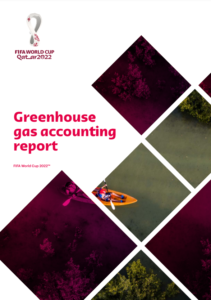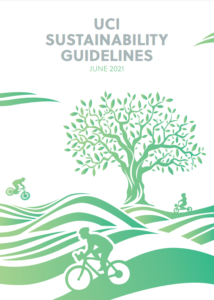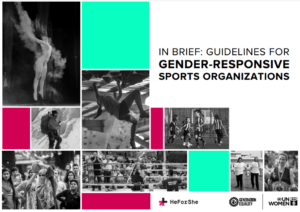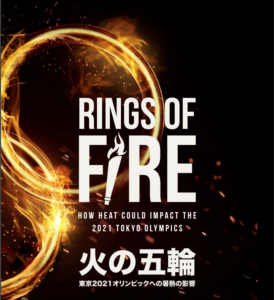
The next FIFA World Cup will take place in Qatar from 21 November to 18 December 2022. Qatar is the first Middle Eastern nation and also the smallest country to host a FIFA World Cup. All stadiums will be within 50km
of the centre of Qatar’s capital city, Doha, keeping travel between matches to a minimum.
Among many other activities, staging the tournament entails the construction and renovation of relevant infrastructure, transporting thousands of people to the matches and Fan Fests, the provision of accommodation, managing waste in the stadiums and broadcasting fixtures in over 200 countries. This scale inevitably has an impact on the climate, yet conscientious sustainability efforts can mitigate its impact.
As the three organisers of this mega event, FIFA, the FIFA World Cup Qatar 2022 LLC (Q22), and the Supreme Committee for Delivery & Legacy (SC) are committed to protecting and conserving the environment. As part of their joint FIFA World Cup Qatar 2022™ Sustainability Strategy, they have pledged to measure, mitigate and offset all FIFA World Cup 2022 greenhouse gas (GHG) emissions, while advancing low-carbon solutions in
Qatar and the region. As a first step, it is important to understand the emissions related to the preparation, staging and post-event activities of the FIFA World Cup.
For this reason, FIFA, Q22 and the SC have conducted an analysis of the projected GHG emissions resulting from the FIFA World Cup 2022 with the support of subject matter experts.
The GHG accounting and reporting procedure used for this report is based on the Greenhouse Gas Protocol, the most widely used international accounting tool for government and business leaders to understand, quantify and manage greenhouse gas emissions. The system boundaries follow the operational-control approach. The reporting period includes tournament-related activities under the control of the organisers between
April 2011 and June 2023.
Click here to download the report



Created by the 11th Hour Racing Team, for the benefit of the wider community, a series of eight How to Guides and Case Studies are part of the TOOLBOX which is designed to make sustainability accessible for any organisation.
Whilst every effort and care was taken when preparing the contents of these guides, applying sustainability is specific to each organization. It is up to the user to make the relevant choices and define what aspects are right to include, important to address or are legally mandatory.

The steps are as follow
- How to start your program
- How to create a policy
- How to engage stakeholders
- How to identify issues
- How to set targets
- How to plan and implement
- How to assess progress
- How to report and communicate
Go to www.sustainabilitytoolbox.com to know more about the Toolbox and to download the various tools, templates and case studies available



These guidelines aim to provide simple, practical and essential information on key aspects of sustainability. It is a tool that will help National Federations, Event Organisers, Teams, and other cycling stakeholders navigate this subject’s complexities and start the journey to developing effective sustainability programmes.
Section 1
Introduces the UCI’s commitment to sustainability and its four pillars, which are the foundation for transforming our sport, and outlines the role cycling can play in an increasingly challenging world.
Section 2
Gives a broad overview of sustainability, the United Nations Sustainable Development Goals, the ISO 20121 management system, and where to start with taking climate action.
Section 3
Contains short overviews, providing a reference point for cycling’s essential focus areas, with case studies of sustainability in practice from cycling organisations around the world.
Section 4
Provides checklists highlighting best practice to help organisers deliver sustainable events that maximise positive and minimise negative impacts on people and the planet. These actions are neither exhaustive nor compulsory. Organisers must think about what is important and realistic for events according to specific local conditions and plan to address priority objectives.
Section 5
Contains tools and resources to advocate for cycling as a mode of transport and encourage better inclusion within our sport.
These guidelines will become an integral part of the sport’s journey towards sustainability.
Additional support for cycling stakeholders will be hosted on the UCI website with dedicated
sustainability action plans, tools and resources for specific user groups.
Click here to download the guidelines
Click here for more information about UCI activities towards sustainability





Guidelines for gender-responsive sports organizations have been developed as a trail-blazing effort to translate the UN Women’s Sports for Generation Equality principles into a feasible step-by-step guide.
The guidelines are structured to help sports organizations in terms of empowerment of women and girls and advancement of gender equality through concrete and quantifiable actions and indicators. They aim to mobilize action on gender equality in day-to-day and overall operations.
Authors/editor(s): Lead author: Professor Canan Koca Co-author: Professor Rosa Lopez de D’Amico Prepared for publishing by UN Women staff: Asya Varbanova, Günes Deren Erbas, Ipek Naz Çınar, Jennifer Cooper, Sinem Aydın and Zeliha Ünaldı Editor: Gretchen Luchsinger, Ece Simin Civelek Design: Asya Fatma Bagcı
Publication date: May 2021


In July 2018 a deadly heat wave struck Japan, with 40°C temperatures leaving over 1,000 dead and 22,000 in hospital with heatstroke. Heat waves hit again in the summers of 2019 and 2020, leaving thousands in hospital as temperatures across the country topped 39°C.
The mean annual temperature in Tokyo, the capital city and host of the 2021 Olympics, has increased by 2.86°C since 1900, more than three times as fast as the world’s average.
Since the 1990s Tokyo residents have frequently experienced more days when the maximum daily temperature exceeds 35°C.
Multiple factors can lead to intense heat and high levels of humidity, but the 2018 heat wave “could not have happened” without climate change say scientists. As Olympic stars, their coaches and heat experts explain in this report, intense heat and high levels of humidity are a threat to athletes at the 2021 Tokyo Olympics.
This study hears from leading triathletes, rowers, tennis players, marathon runners and scientists advising athletes how to cope in extreme conditions. All love their sports and are passionate about the Olympics. Yet all voice fears that climate impacts will affect their health and performance in Tokyo this summer.


International Safeguards for Children in Sport
A guide for anyone supporting or governing organisations who work with children.
This guide has been developed based on the experiences of over 50 organisations who have been piloting the International Safeguards since 2012. The quotes and examples throughout this guide are based on their experiences. This project has been led by a Founders Group of leading safeguarding organisations and is based on research conducted by Brunel University led by Dr Daniel Rhind.


Sustainable sourcing guidelines for branding and signage materials
These guidelines are a joint publication by the International Olympic Committee (IOC), the Union of European Football Associations (UEFA) and The Ocean Race.
They are intended to be used by professionals in charge of designing and procuring branding and signage materials for events. The content can be used, for example, to brief suppliers or to define sustainability requirements in calls for tenders or in contractual agreements.
The guidelines have been developed using the detailed information contained in the “Environmental impact evaluation of branding and signage materials for events” IOC-UEFA report, and in consultation with a group of event organisers and signage specialists coordinated by The Ocean Race. References to the IOC-UEFA report are included in the last column of the table below, to allow users to access more detailed information on specific types of materials or sustainability topics.
The focus is on the environmental impact of materials. The social impact of sourcing is important too. However, this can be managed through more generic supplier requirements and is thus not covered by this document.
Download the guidelines here



The SHiFT is an online platform built on the power of collaboration which celebrates a wide range of solutions dedicated to solving the issue of ocean plastic pollution.
It is based on the SHiFT Method, created by Emily Penn, ocean advocate and eXXpedition Co-Founder.
The platform allows you to select how, in what aspect of life and where you want to create a shift, from sea to source. From simple consumer choices, to more complex industry actions, you can explore ideas that create long term change.
Use the filters to quickly navigate hundreds of solutions, pick the one that’s right for you, take action and inspire others to follow. On each solution card, we’ll point you to the information and resources you need to find your superpower and make a shift.





How are sport for development organizations keeping children healthy during COVID-19?
UNICEF developed a blog to explore how Sport for Development (S4D) organisations have responded and adapted their programming to support children during the COVID-19 crisis. S4D organisations use sport as a tool to catalyse positive change in the lives of children, youth and the communities they live in. Interviews with S4D organizations, conducted as part of the ongoing research commissioned by the Barça Foundation and UNICEF partnership, revealed that organizations are innovating to adapt to the current crisis through three key interconnected practices:
Continuing to support children through remote sessions, with coaches providing guidance for physical activity along with content to accomplish a variety of social goals.
Providing critical and accurate health and COVID-19 information through coaches, who are in many cases trusted individuals in communities.
Supporting their staff in helping other programmes, such as feeding programmes, while sports activities are closed.
Click here to access the blog


Environment Impact Evaluation of branding and signage solutions for events
The International Olympic Committee (IOC) and the Union of European Football Associations (UEFA) have investigating improvement opportunities in the area of branding and signage.
Among the various sustainability topics associated with event delivery, reducing the environmental impact of branding and signage solutions has proved a challenging task do date. Few commercially available solutions meet the needs of event organisers in terms of quality, ecology and cost. Besides, ecological claims are rarely supported by credible data based on product lifecycle evaluations, and few products are certified according to recognised ecolabels.
Branding and signage materials are not only a very visible aspect of events; they are often the number one source of single-use plastic, a large part of which is still being landifilled or incinerated.
In this context, the IOC and UEFA commissioned Anthesis, and independant consultancy specialising in environmental impact assessment.
This guideline covers over 40 materials, both commonly used materials as well as more innovative ones, and is a first attempt at improving the knowledge base on this topic.

